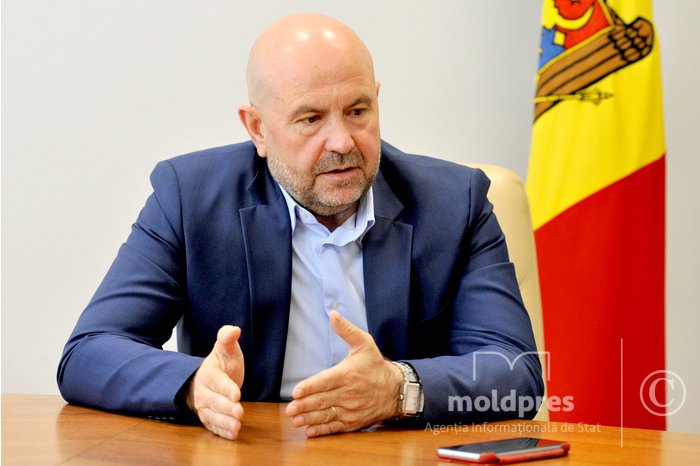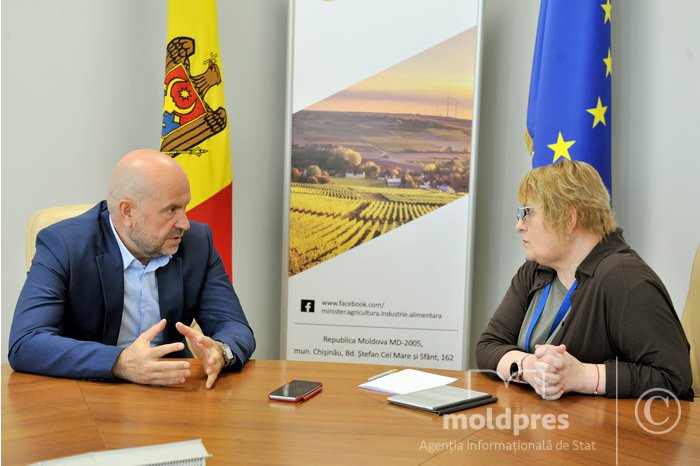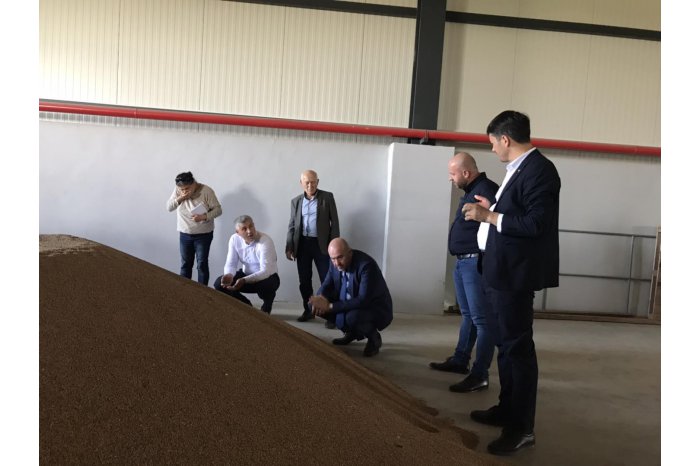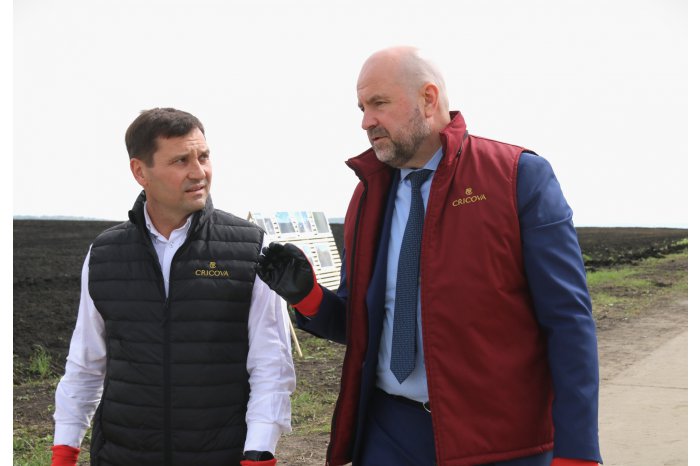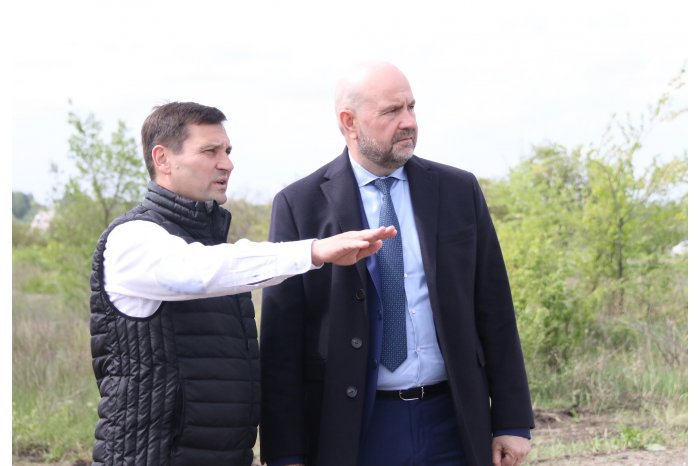EUROPEAN MOLDOVA // Moldovan deputy PM says agriculture, producers, farmers, sectors' enterprises would only take advantage from EU integration in terms of volume of sales, price potential, creation of profits
18:48 | 11.05.2024 Category: Interview, Event
*Moldova submitted the application on accession to the European Union on 3 March 2022
* Moldova got the status of country candidate for accession to the European Union on 23 June 2022
*The European Council on 14 December 2023 ruled to open the negotiations on accession to the European Union with Moldova
*Moldova is in full process of assessment of the degree of compliance of the national legislation with the European Union’s one, a first stage for the state’s accession to EU
*The authorities aim for Moldova to join the EU by 2030
Interview given with MOLDPRES State News Agency by Deputy Prime Minister, Agriculture and Food industry Minister Vladimir Bolea
MOLDPRES: Mr. Deputy Prime Minister Vladimir Bolea, which is the zero priority of the agriculture minister, in the present context of the sector, marked by more turbulence, both local and regional, as well as international?
Vladimir Bolea: You should know that, in reality, there are a lot of priorities and all of them can be call zero priority. If I systematize them according to their value, all of them would on the first place.
First of all, we must consolidate the entire agricultural segment from Moldova, after which we should develop the economic components extremely much. In Moldova, the agriculture is based a lot on work, on physical labour and quite a little on the economy’s components. A lot of calculations show scarcity in the process of development of agriculture in itself.
Or, the freshest data shows that, due to the policies made by the Agriculture and Food Industry Ministry (MAIA), in terms of subsidization in the last two years, the volume of production increased in the animal husbandry branch of Moldova. It is about meat, dairy products, products coming from them, etc.
In other words, we talk about the development of the agriculture from Moldova as a priority through the light of identifying economic solutions. The poverty is the result of an economic inefficiency in the agriculture from our country. This is the most important thing, on which we focus very much.
MOLDPRES: Can we talk about concrete results?
Vladimir Bolea: Yes. It is about a good deal of the farmers who quite well implement last generation technologies in the model of tilling the soil. We have advanced orchards; we have producers and processors of quite advanced grapes - a thing proved by the multitude of medals got by our producers at prestigious specialized contests.
On the other hand, if we refer to a national concept, then we should learn how to better sell all that we produce. I give an example. When I was in Germany, a representative of the Agriculture Ministry from Germany said that they, having 100,000 hectares of vineyard, technical varieties, produce and sell products, diverse types of alcoholic products worth 1,400,000,000 euros.
In Moldova, declaratively we have about 125,000 hectares; we produced and sold worth approximately 200,000,000 euros. So, it is an extraordinary efficiency. And all these things are reflected in the incomes of the companies from Moldova.
And everything is in chain. The lower are the profits of the farmers, the lower the salaries in agriculture are, the poorer are their possibilities to invest in environmental programmes and many other things. Everybody eventually benefits from their financial capacity.
There are several basic pillars in the process of economic development of the agriculture. We talk about the pillar of the economic sustainability, i.e. it should be with profit. The second one – the sustainability of the environment. If the producer has profit, he is able to invest in projects on the development of the environment, which need quite large investments and do not quite bring profit for the moment. And the third one – the social sustainability. The larger are the profits at the economic agents on this dimension, the higher are the salaries in agriculture. Concluding about the component No 1 of the programmes of the Agriculture Ministry, is for us to talk about the economic development of the agriculture.
MOLDPRES: The vine-growing and wine-making branch is regarded as an invincible stake for Moldova. Can other sectors be identified, which would make us equally famous?
Vladimir Bolea: The horticulture. We have already results which are also recognized. We talk about table grapes; we talk about our apples with special fragrance and absolute taste, which make difference from the other types of apples. In other words, the horticulture in its entire spectrum. I think that we might put a quite big emphasis also on the development of the animal production, such as the dairy products from Moldova, which have a very, very good taste. These are products worth being promoted by the policies of export.
We talk about our different sorts of cheese; we talk about our dairy products. Due to a national programme on the development of the animal husbandry in Moldova, we have made already outstanding progress as regards the increase in the livestock, on the dimension of milk cattle and the quantity of milk. The subjects should be regarded in complexity. This year, we finished a process as concerns Moldova’s authorization as third country from which the exports of eggs, fowl, slaughtered and refrigerated, is allowed. We have started the process of work on the potential of Moldova’s authorization as exporter of dairy products, as well as other similarly important actions.
MOLDPRES: Where the agriculture and food industry minister would like the products from Moldova to go, besides the already known markets?
Vladimir Bolea: Where? Where much money is made. The work of the farmer is, from my point of view, extremely difficult and the work of farmers is part of the category of vital things. The people can live without cars, can live without new clothes, can live without internet, without technologies, without anything. But the man physically dies without air, without water and without food.
And from this reason, we must have profit, so that we are able to have a sustainable development in our activity, to guarantee something. Therefore, we should sell and export anywhere where more money can be collected.
MOLDPRES: Do the subsidies have a long-term role in this respect?
Vladimir Bolea: We talk about a programme on subsidization which is presently described by the Agriculture Ministry as an investments programme. The subsidies are the state’s investments in the agriculture from Moldova, as vital branch of the national economy. Whether this is priority or not, calculations, what it is its percentage of the Gross Domestic Product (GDP), how much profit it brings and many other things are important, but the agriculture is a vital branch. The life is impossible on this earth without food.
Now, the programmes on subsidization worked out by Moldova’s government, Agriculture Ministry are investments in directions which so far have been lacking or have never been backed by the cabinet. Therefore, we presently talk about the development of the irrigation systems, without which no high productivity can be.
We have invested in the process of rehabilitation of the animal husbandry from Moldova, its revitalization, as we got to a phase, in 2020, where there were 5,100 cows in the farms of Moldova. I.e., there was a number which, from my point of view, was to be equal to zero or was to be very small, too little, too much uninteresting for an economic activity.
I reiterate that this is a vital activity, but which should be based on economic plan. If an economic agent carries out this activity, in the end, when it sums up the results at the end of the year, it does not profit, does not have some money collected, it closes up this activity.
Therefore, we will develop quite interesting programmes on subsidization for the agriculture from Moldova, in order to be sustainable. And the most important thing, we are a very small country, but at the same time, everything we produce in Moldova is produced in the region, in all countries. We compete with everybody in the Black Sea basin’s region.
And all the others around us, unfortunately for us, have a much higher productivity in all sectors. If we talk about cereals, they have larger areas in hectares, have higher productivity. If we talk about Romania, EU member country, then the level of subsidization is completely different from ours, as the countries of the European Union have a completely other type of policies and financial potential. Therefore, we want very much, as state, to get into the European Union. The agriculture, our producers, farmers, enterprises from the sector would only take advantage, in terms of the volume of sales, potential of price, making of profits, etc.
Yes, the requirements are strictly economic or in terms of quality and when you meet them, both as country and as economic agent, then you have absolutely no danger to export your production from Moldova to the market from the European Union.
MOLDPRES: How much time the licencing of the import of cereals from Ukraine might be valid?
Vladimir Bolea: Under the law, which entered into force in December 2023, we extended the licencing for the first three months, we prolonged it for another three months and we will subsequently decide proceeding from the needs from the region, as we live in a quite atypical and extremely complicated period.
The licencing was exclusively an administrative instrument implemented by Moldova’s government for balancing the price and ceasing the sharp decrease and collapsing of the price. We created it as an administrative instrument, as a leverage, we can also put is like this, of negotiations between the producers of sunflower, farmers and processors, which is single, from the viewpoint of the economy and of everybody; it is monopolist, it holds more than 75 per cent of the processing capacity.
If we make an analysis, we see that the farmers from Moldova presently have possibility to sell everywhere and each month we make exports of sunflower and we will now make public the quantity of sunflower exported in the last month, according to data from customs.
And will be issue licences of import, so that the economic agent is able to produce, cover its production needs for each month, so that it has no losses, first of all, and secondly, so that the people receive salaries.
Yes, we talk about the processors and, look out, the most important thing, we talk also about the citizens of Moldova, the part of the population made up of pensioners with quite low revenues, public sector employees, policemen, military, children, who must eat every day. Or, the sunflower oil is daily consumed by all of us.
What matters for me a lot is that the policies and approaches which we have as state and as government should not lead to the increase of the price for the end consumer. We give you, cereals grower, some money, investing with you, but instead, you guarantee that we in Moldova have the needed quantity of sunflower, so that the price for the end product, the oil, should not increase, so that the citizen can afford buying this oil.
MOLDPRES: How justified seem to you the protests of the farmers and haven’s they turned already into a leverage of political manipulation?
Vladimir Bolea: No. I did not regard it through the light of the political analyses; I was less interested in this, not to say that was not interested at all. I regarded it through the light of the economic problems of the farmers.
We talk, in general, about a big problem which was triggered and began in 2022, when the war started. When the war began, an economic structure, a member of which Moldova was, collapsed. The ways of export which we had disappeared; we exported 70 per cent of the cereals through Reni, Odessa from the neighbour country and now practically quite a little or zero.
We were exporting goods to Turkey, worth about 850 million dollars, while now we practically no longer export cereals to Turkey, as they supersaturated their market; they buy from Ukraine or buy from Russia. Practically, the collapsing of the price resulted, in chain, with a lot of extremely serious consequences for Moldova’s agriculture. Besides, those 70 per cent of the cereals exported through the ports of Ukraine at one time were redirected by car to our exit customs checkpoints.
The time of stay in customs was prolonged very much, up to 8-10 days and this entailed the increase in the price for transport. Any logistic increase in price results in the cheapening of the product for the farmers who grew it.
The economic problems, not to speak about the increase in the price for inputs, the price for diesel grew; the price for fertilizers and many other things increased. The problem is an economic one. And the solutions elaborated by the Agriculture Ministry and backed by the government were also economic solutions.
First of all, we talk about the 200 million lei distributed to the producers of wheat in the autumn of 2022, by 1,232 lei for each hectare. Why we did this? In order to decrease the prime cost.
As for the economic problems faced by the farmers from Moldova, making an analysis again, a general one, we come up with economic solutions. It is difficult for everybody, but as a result of the financial potential provided by Moldova’s budget, we come up with targeted solutions namely for those on the edge of the bankruptcy or in the state of insolvency.
MOLDPRES: What can you say about a regionalization of the country in terms of agriculture, so that each region prioritizes the more efficient works, depending on the geographical position and benefits from state subsidies only according to these criteria?
Vladimir Bolea: The agricultural activity must be based on profit, not on regionalization. On profit. The Agriculture Ministry, through its institutions, can come up with recommendations, as we should stop making losses in the national economy and in agriculture.
If you, in Moldova, have 280 mm of precipitation in the southern region, 300-400 mm in the centre and 500-600 mm in the north and you sow maize in the south of Moldova and harvest 3-4 tons per hectare, the one in the centre has 6-7 tons and 7-8 tons of maize in the north, then it is about competition inside the country. The level of technologies, the level of expenses is the same, but you lost the competition inside the country in terms of the formation of the price.
Or, the selling price is not created in Moldova. It is created at the exchange; you subsequently export in the same direction or through the same economic agent which deals with export from Moldova. I repeat – you have lot the competition inside your country. You are to the bad at one or another product.
Before taking the decision what to eat, how to eat, you should see what the profitability of this product is. Do you manage to cover your expenses or not? Will you earn money or not? This depends on this economic result. Will you have people in the village to work for you or not? The future of Moldova’s village depends on man. If you do not have profit, do not pay salaries, people leave the village.
Any goal of the agricultural activity must result from the profit.
What should I eat, whom should we sell, how we sell, whether we associate, do not, why we do not associate, which is the final profit which you have or do not have? Or, the new structures which we will create – Agricultural Chambers - will help us on this issue on the dimension of the Agriculture Ministry. The chambers should inform the people and help them discover their potential. We in Moldova do not sell anything which might not be sold with profit.
We should return a bit to calculations, in the direct sense, as we cannot dictate the selling price in regions. We cannot dictate it. Neither Romania, which produces 12 million tons of wheat for export, can dictate.
Ukraine, which produced 28 million tons last year, does not dictate the price. There are exchanges. But what we can do along with the farmers? We can cut the cost price. Cut the useless expenses. But how we can cut the useless expenditures? Through the creation of groups of producers, cooperatives and many other things.
We do not even discover the bicycle. All these things proved their economic efficiency in the West. That is why they are so efficient. They are efficient at the maximum. They cut the expenses. They do not have higher profits than the farmers of Moldova. They have fewer expenses. This is the biggest difference.
MOLDPRES: Name, please, at least three measures, badly necessary for the moment, for the eradication of the corruption in the agro-industrial sector?
Vladimir Bolea: I do not know corruption cases on the dimension of the ministry which I lead. But I think that the one of the efficient measures is the digitalization, as little as possible contact, removing the human factor in some kinds of activity. When the measures of subsidization are quite clear, they do not give one possibility to draw the conclusion that it can both in one way and in another. Another thing is that the state structures and the law enforcement structures should do their job efficiently.
And then the corruption is removed. Though, you know, the man, unfortunately, is weak-willed. Or, some people, when they go through the so-called control, so to say, this temptation, they do not have the strength and honesty so say NO and to understand that the tolerance to corruption must be zero. There isn’t a little, there isn’t I do not know how much, you know? The tolerance must be zero.
And not to take anything from what is not legal is something normal. Yet, to my great satisfaction, at present, we clearly speak about that fact that such thing does not exist in the Agriculture Ministry. And on the dimension of AIPA (Agency of Intervention and Payments for Agriculture) in the same way. ANSA (National Food Safety Agency) fights, the police fight with them as well.
The fact itself that we have, in continuation, vacant positions at AIPA and ANSA, at the level of deputy director, from my point of view, speaks namely about the fact that that the measures taken by the leadership are efficient. We are looking for good-faith people, very good specialists who are employed to work without taking absolutely no bribe.
Yet, quite regretfully, I must recognize, extraordinary bad things have happened in our country, from my point of view. We started hearing everywhere expressions of the kind ‘’he steals, but gives me too,’’; one hears about a rich policeman that ‘’the guy finds his way about.’’ The same thing can be said about a rich customs officer. Things are same at the highest level, as concerns the thieves of public money – ‘’they stole one billion, but they gave too.’’
The size of the bribe does not matter – one thousand, two thousands, ten thousand lei, when the present, the future are sold. These are quite serious phenomena, from my point of view. And their cleaning takes time. Yet, these problems can be eradicated only through economic growth. The level of the income should allow the citizen living a worthy live in the country.
MOLDPRES: Which will be the next activities for the interconnection of the agro-industrial sector from our country with the one from the European area, as Moldova is country candidate for accession to EU?
Vladimir Bolea: We continue and I should say that, till 2027-2028, we have ambitious projects.
We finish the process of transposition of the legislative acts on three chapters, which will allow a more intensive development of the agriculture from Moldova.
The Agriculture and Food Industry Ministry (MAIA) deals with the working out of policies. The elaborations must be made under laws, government decisions, regulations, orders and all they should meet the requirements of the European Union.
We are country candidate in the process of accession to the European Union and this implies that we must elaborate the legal and legislative framework from Moldova in strict accordance and conformity with the EU countries. This will allow us much deeper interconnect as regards our production processes with the EU’s requirements, which will subsequently lead to permissions of export of our production with no problem.
MOLDPRES: Does MAIA have relevant policies for a more active involvement and keeping of young specialists in the branch?
Vladimir Bolea: We have already started the process. The creation of a complex of super-advanced greenhouses, about 1,000 square metres, at the Technical University, where there are also faculties with agricultural profile, allows raising the level of teaching.
Children presently do not learn on pictures, drawings, video, but in practice. Both students and people training for master’s and doctor’s degree make laboratory works, as the agriculture is not only theory, but is theory which must be showed in practice, in order to be successful.
The second step which we made for raising the interest in education in agriculture is that fact that we gave 568 hectares of farmland which once belonged to the Agrarian University; presently we transferred them to the Technical University. We also approved, at the ministry, the transfer of 1,380,000 euros – money due to be used for the modernization of the education rooms, creation of field laboratories and for the works which are to be carried out on these 568 hectares, so that it becomes a laboratory in the open sky in several years.
As for the rest, if we talk about the keeping of these young specialists in Moldova’s economic framework, as this is the sense of their training as very good specialists, this is strictly connected with the profits of the economic agents. We must develop them from the economic viewpoint, so that they have profits, can pay salaries comparable with the ones from the European Union. Or, these economic agents, backed by our programmes on keeping, in several years will reach a level of profit allowing them to pay interesting salaries to young specialists, so that they do not leave our country.
One cannot oblige anybody, administratively or in another way, to remain in the country, as the man is free and we are a democratic state. I understand the need of the competition and namely we presently compete in terms of salary payment with the countries of the European Union. This thing should give us an impetus in the process of economic development of our state.
This is a process of competition; we lost the start of this competition; yet, only the state’s economic development will entail increases in salaries. We must develop an attractive and tempting, de-bureaucratized legal framework, inside which businesses will develop. The state increases the pensions only due to the fact that we have economic agents which increase their profits, the economic activity. The transfers to the budget grow and we are able to increase the pensions of Moldova’s citizens from them. And the salaries are paid by economic agents from their taxes – to everybody, both to public sector employees and private ones.
For this reason, the main goal of the Economy Ministry and ours, on the agro-industrial segment, is to develop the economy and create conditions for increasing the profitability in our national economy.
MOLDPRES: How do you assess the plans on more intense cooperation of the Technical University with the State University?
Vladimir Bolea: At this point, we talk about collaboration between these two institutions.
I am very much happy that the processes of unification have started in Moldova. Starting from 1991, when the collapse of the USSR began, I think that this process of disintegration took place till its maximal phase. I.e. the existence of something which can be disintegrated was impossible and all these things led to the appearance of tens of universities. There were too many. A too large number of universities versus the potential of students we have. The thing is that the universities should exist for students and what we are interested in is the quality of teaching.
The specialist who presently graduates from the Technical University on the labour market is in competition with the United Kingdom, Germany, Italy. Everything we should be interested in, as citizens of this state, is that the young people who learned or who are to study at these universities can benefit from university quality. Will an eventual student be able to compete on the labour market or not? Or he/she only studies at the faculty in Moldova and then leaves for Italy and works as unqualified worker? Either it is called Technical University, or in another way, these names have no sense and great significance, in my point of view.
The quality of teaching, the conditions of teaching, the professions which they learn matter and also to what extent the young specialist meets the current requirements.
The faculty matters, the name of the faculty, the quality of the teaching and the number of students. The education institutions exist for children, for students, for pupils, not for medals, not for the teachers, not for pompous names. During years, we endeavoured too much for different symbolisms, which got to be sterile and useless. This does not yield positive results and does not educate specialists.
MOLDPRES: Do you think that the powers of the structures subordinated to MAIA are fully turned to account? Where work is still needed?
Vladimir Bolea: We have institutions under reformation. For instance, two institutions, Selectia, from Balti and Porumbeni, set up a national centre for the production of the seed material, with big emphasis on the elaboration of new hybrids, resistance to drought, as well as on the promotion of the agriculture on the dimension of the production of the seed material as scientific basis.
After which, we will turn the Institute of horticulture, viticulture, animal husbandry into a national institute of applied sciences, according to the European model, where the key word is ‘’applied,’’ in agriculture and veterinary medicine. We give them possibility to revive, to rediscover their activity in practice. The important thing is that this activity should be on certain dimensions and providing of services in our national agriculture, but not in form of projects and laboratory analyses about nothing.
In due time, these structures must be as efficient as possible. We have much work to do. Unfortunately, during years, all these institutes have degraded also in terms of scientific activity and, what is most painful, from my point of view, is that these institutes lost their direct connection and relation with the agriculture and the national economy.
MOLDPRES: Are you the minister who does not believe in tears and lyrical digressions?
Vladimir Bolea: No. In profit. Profit and economic value. As the poverty comes from the lack of profit. And the problem is economic, mathematical. You either have money or not. There is simply no room for metaphors here. Either you have or you don’t. You can say the nicest metaphors, but they deal with culture, not with agriculture.
At the Botanical Garden, trees are grown nice, not for harvest; in the same way, at the Zoo, nobody is expecting milk and cheese from the animals there. Yet, as regards everything dealing with agriculture, the computer is turned on and the animals are demanded to be highly productive. Trees must have fruits. The fruits should be able to be sold. Quality is needed. Completely other criteria appear here. And there is no room for metaphors.
MOLDPRES: Moldova’s citizens are called to participate, in next autumn, in a referendum on the European integration of Moldova. The authorities are set to put down the strategic goal of European integration in the Constitution, if the citizens vote, at the plebiscite, for this desideratum. Which are your arguments to persuade Moldova’s citizens that the integration into EU is the fittest choice for the future of our state?
Vladimir Bolea: Moldova is a quite small state; our domestic market is very small. Presently, the agriculture from Moldova is based on producing agro-food production which is fully meant for export.
Or, the presence of Moldova in the European Union means for us sustainable growth. I.e., the motivation for the great majority should be the profits and the economic component, which can take place only by being member of this big Union.
Mr. Deputy Prime Minister Vladimir Bolea, thank you for the interview!
Correspondent: Lilia Grubii
Photo: Mihai Vengher
